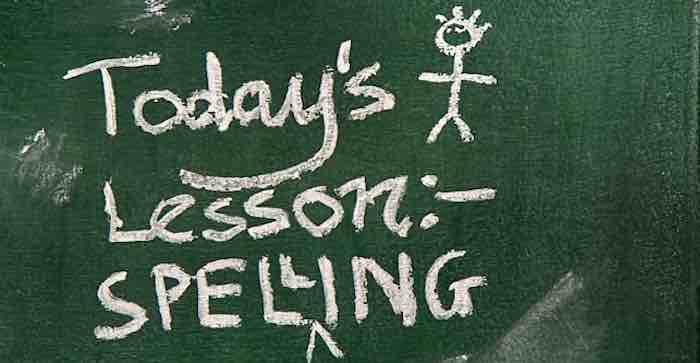Yes, it’s a serious business with threats on all sides. Sight-words are the beginning of many problems. Avoid them
K-12: Sight-Words vs. Vocabulary Words

Many people use the phrases “sight-word” and “vocabulary word” interchangeably, when they are quite different. This confusion, I believe, serves a sinister purpose for our Education Establishment.
A sight-word is a one-dimensional object. You know it visually, that’s all. When you see the graphic design, you are supposed to respond in an automatic or conditioned way. You say the sound represented by the design. The Education Establishment pretends this is “reading” but it’s not.
On the other hand, a vocabulary word is a multi-dimensional object. Most importantly, you know it phonetically. You say the sounds represented by the letters. This is real reading although the Education Establishment would like to pretend otherwise.
When Whole Word was first introduced circa 1931, the phrase sight-word had a very precise, very limited definition. Remember that children did not learn the alphabet or the sounds. Spelling or sounding out a sight-word was out of the question. Students might know many hundreds of sight-words and not be able to spell any of them, or sound them out.
As noted, a vocabulary word has many dimensions. You interact with a vocabulary word in several ways. You can spell it. You can sound it out. You know its syllables. You know its meaning. You might know the origins of the word. You might know synonyms. In short, you really know a vocabulary word.
Vocabulary words are wonderful and every child should memorize as many vocabulary words as possible. Traditional education has always included booklets with lists of vocabulary words for children to learn. We need to return to this practice and double down on it.
On the other hand, no child needs to know even one sight-word. They are a waste of time and, and beyond that, actually destructive. They clutter up the brain with things you don’t need to memorize, and prevent the acquisition of a phonetic reflex. It’s precisely this wrong, wasteful, and inefficient approach to reading that the Education Establishment seems determined to perpetuate. So, probably by intent, they have got parents and teachers using these words in a sloppy way. Naïve parents repeatedly hear the phrase “sight-word” and think this thing must be acceptable. It’s not.
Our Education Establishment is so goofy and twisted but finally so obvious. They agitate against memorizing the multiplication tables, place names, dates, historical facts, or the details of vocabulary words, things that are very valuable. At the same time, the Education Establishment advocates for the brute memorization of sight-words, three to five per week. A pathetic and destructive accomplishment. Let’s spell this out: useful memorization of academic material is declared bad, which is a lie. Pointless memorization of sight-words is said to be good, another lie. On that perversion is built today’s very inefficient school system.
The nasty little scam of American K-12 is the tendency to conflate sight-word and vocabulary word so that everybody will be confused. The goal seems to be to sneak in as many pure sight-words as possible. As young students move along that road, they lose the ability to become fluent phonetic readers. Their wiring is messed up. This confusion has the separate impact of making discussions of reading issues nearly impossible.
For average people, the upper limit on memorizing sight-words is 100 up to 500. That’s not a way to learn to read. But our Education Establishment pretended that it was. They still pretend it’s a good way to start. But 100 sight-words is almost an insurmountable goal for most first graders. In the same time that a child can learn phonics and be able to read almost any English words, you can keep the child busy learning almost nothing. What choice would you make if you had any conscience at all?
Starting in 1931, all of American elementary education depended on the memorization of sight-words, which is why our elementary school children were always in such bad shape. The Education Establishment needed an alibi and that tended to be “dyslexia,” probably a fancy word for kids not being read because they were made to memorize sight-words.
The best reform strategy now is to eliminate every sight-word. They are spoilers, preventing true literacy.
Nora Chahbazi, phonics expert, notes that: “Students move from sounding out words to automatically knowing the words, which can appear as if they have visually memorized it… When they haven’t. This explanation is beneficial to share with the multitudes of educators who believe that sounding out words hinders fluency, which is inaccurate and actually backwards. Typically, one to four repetitions at sounding out words results in committing the word to memory.”
The Education Establishment has got teachers and parents using “sight-word” and “vocabulary word” as if they are synonyms. In this way ourSchool officials provide cover for making children memorize what they don’t need to memorize, a sight-word. We have a lot of confusion now in elementary schools, which hurts everybody except the following: publishers of books with controlled, i.e., limited, vocabularies; administrators who create and supervise unnecessary levels of remedial instruction; and ideologues who don't believe in universal literacy.
Yes, it’s a serious business with threats on all sides. Sight-words are the beginning of many problems. Avoid them.
Bruce Deitrick Price -- Bio and
Archives |
Comments
Bruce Deitrick Price has been writing about education for 30 years. He is the founder of Improve-Education.org. His eighth book is “Saving K-12—What happened to our public schools? How do we fix them?” More aggressively than most, Price argues that America’s elite educators have deliberately aimed for mediocrity—low standards in public schools prove this. Support this writer on Patreon.

 Many people use the phrases “sight-word” and “vocabulary word” interchangeably, when they are quite different. This confusion, I believe, serves a sinister purpose for our Education Establishment.
A sight-word is a one-dimensional object. You know it visually, that’s all. When you see the graphic design, you are supposed to respond in an automatic or conditioned way. You say the sound represented by the design. The Education Establishment pretends this is “reading” but it’s not.
On the other hand, a vocabulary word is a multi-dimensional object. Most importantly, you know it phonetically. You say the sounds represented by the letters. This is real reading although the Education Establishment would like to pretend otherwise.
Many people use the phrases “sight-word” and “vocabulary word” interchangeably, when they are quite different. This confusion, I believe, serves a sinister purpose for our Education Establishment.
A sight-word is a one-dimensional object. You know it visually, that’s all. When you see the graphic design, you are supposed to respond in an automatic or conditioned way. You say the sound represented by the design. The Education Establishment pretends this is “reading” but it’s not.
On the other hand, a vocabulary word is a multi-dimensional object. Most importantly, you know it phonetically. You say the sounds represented by the letters. This is real reading although the Education Establishment would like to pretend otherwise.